|
|
|
Sort Order |
|
|
|
Items / Page
|
|
|
|
|
|
|
| Srl | Item |
| 1 |
ID:
067000
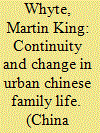

|
|
|
| 2 |
ID:
105893
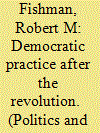

|
|
|
|
|
| Publication |
2011.
|
| Summary/Abstract |
This article examines democratic practice after the revolution that brought an end to authoritarian dictatorship in Portugal in April 1974, taking the Portuguese case as an opportunity to theorize democratic practice and historical processes that shape its emergence. The argument stresses the distinctive features of democracy born in social revolution and the explanatory role of the partial inversion of social hierarchies and remaking of cultural repertoires in social revolutionary settings. The Portuguese case is compared to its larger neighbor, Spain, which moved from authoritarianism to democracy at roughly the same time following a process of change thoroughly unlike that of Portugal. Comparisons with other instances of postrevolutionary democracy and implications for more conventional democratic systems are also introduced. A central theme concerns the extent to which democracies attain the ideal of full political equality among citizens. This article asserts that democracies born in social revolution may approximate that ideal for reasons rooted in their historical pathways to representative government.
|
|
|
|
|
|
|
|
|
|
|
|
|
|
|
|
| 3 |
ID:
130808
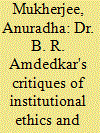

|
|
|
|
|
| Publication |
2014.
|
| Summary/Abstract |
Ethics and morality are the milestones of civilization in the true sense of the term. These concepts again are not static but evolve with greater implications and subtler nuances as humanity strives to grow towards perfection- the ultimate end of existence. ' whether biologically or spiritually. In the context of Indian thought, the traditional, age-old dictums of ethics and morality. having undergone numerous interpretations and changes have experienced a new set of values,' however latent in the traditional interpretation of Dharma or Niri- with the advent of" nationalism, the emergence of a new nation-state and the concurrent vision of human rights. The Constitution of India fully recognizes the moral as at par with the modem, that is, the western ideals of morality in the realization that in the context of Dalit uprising in modern India, the traditional ideals of ethics and morality are to be reviewed. Obviously this shows that what is legal should be ethical and moral or rather. what is ethical and moral tnust have its place in law. It is from this perspective that the modern-day Dalit struggle against injustices, age-old as they are. are to be seen and Dr.B.R. Ambedkar's initiation to this struggle was aimed at bringing ethics and morality to work at the state level, subjugating the Nili forest while lawgivers to take a backseat before the universal laws of morality. To understand Ambedkar's stand on the place of ethics and morality in Hinduism, one must see the reasons that made him strike out at the roots of Hindu social ethics. The Hindu social life was traditionally ruled by Dilemma. Dharma guided a Hindu's'Iife from birth to death by a set of rules strictly laid out for everyone in society. The observation of these rules was morality and the underlying ethics of these duties and rights was ?rst ofall, societal good, i.e., good for 'all. The second part of this ethics was that by observing this social morality, an individual will attain perfection. In accordance with these concepts, the Dharmas/zastras dictate the functions ofthe state and the king. The Nili and Dandanili emanate from one source and with one ideal- that is to maintain the social order by arranging for the speci?c duties of each and every member of society. Consequently. rights came as group rights and institutional rights as laid out in the Dharamshastra'. And over and above everything was the belief in the law of Karma that sanctified the rule of l/Z7I'l7aS/1I'uII7(l, or ones station in life as prescribed by onc's birth. These two essential features of Hindu society made it a highly stratified one so that the passage of' centuries only tightened the rules and the rituals pertaining to these two rules. The solemn and noble hymns of Rigveda. where the philosophy of Vedic seers and poets as the world being one and where everyone was the other's kin. I Va.t'zzdlmibu Kzzrumba/(um )' is the spirit of the ancient Indian Vedic realization. The utmost ideals of human dignity with the universal ethics of righteous behavior and the universal morality of conscientious behavior were preached in their fullest glory. . '
|
|
|
|
|
|
|
|
|
|
|
|
|
|
|
|
| 4 |
ID:
146711
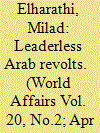

|
|
|
|
|
| Contents |
Examining scholarly literature on the recent and ongoing changes in the Arab world, this article makes a comparative analysis of the conceptual definitions of social, political and non-political revolutions to draw certain themes and explains regional events in the light of various ideological and sociological theories. It concludes that most Arab states are trapped in the conundrum of authoritarian rule or chaos and remain hostages of the secular military or Islamist “deep state” oligarchies.
|
|
|
|
|
|
|
|
|
|
|
|
|
|
|
|
| 5 |
ID:
024587
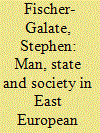

|
|
|
|
|
| Publication |
New York, Praeger Publishers, 1970.
|
| Description |
xiii, 343p.Pbk
|
| Series |
Man, State and Society
|
|
|
|
|
|
|
|
|
|
|
|
Copies: C:1/I:0,R:0,Q:0
Circulation
| Accession# | Call# | Current Location | Status | Policy | Location |
| 007124 | 947/FIS 007124 | Main | On Shelf | General | |
|
|
|
|
| 6 |
ID:
050111
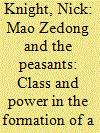

|
|
|
|
|
| Publication |
Jan-March 2004.
|
|
|
|
|
|
|
|
|
|
|
|
|
|
|
|
| 7 |
ID:
124313
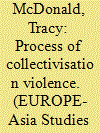

|
|
|
|
|
| Publication |
2013.
|
| Summary/Abstract |
This article attempts to conceptualise violence, and to determine the value of that concept as a lens through which to understand the Soviet collectivisation drive and its legacy. The central claim is that objective violence, the very real experience of the collectivisation drive, becomes subjective violence as it is internalised over time. In the context of the process of collectivisation violence, the lines between victims and perpetrators were blurred in important ways. The end of the Soviet Union triggered a re-evaluation of the meaning of that violence which is still in a state of flux today.
|
|
|
|
|
|
|
|
|
|
|
|
|
|
|
|
| 8 |
ID:
137745


|
|
|
|
|
| Summary/Abstract |
The fourth volume of Michael Mann’s The Sources of Social Power is the last in his historical sociological series, which has centred on an analysis of ideological, economic, military and political power in human societies from the start of civilisation. Mann’s final volume provides an important overview of the period of American hegemony and its worldwide effects, the rise and crisis of neoliberalism, the contrasting fates of the USSR and Maoist China, the vagaries of American empire, and modern revolutions. The implications of his study, particularly regarding the history and theory of revolutions, are of the utmost value to anyone on the Revolutionary Left today, especially in the Third World. While Mann’s study is primarily focused on the West, it provides important lessons to be drawn for the Third World.
|
|
|
|
|
|
|
|
|
|
|
|
|
|
|
|
| 9 |
ID:
030693
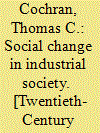

|
|
|
|
|
| Publication |
London, George Allen & Unwin Limited, 1972.
|
| Description |
178 p.
|
| Standard Number |
0099730061
|
|
|
|
|
|
|
|
|
|
|
|
Copies: C:1/I:0,R:0,Q:0
Circulation
| Accession# | Call# | Current Location | Status | Policy | Location |
| 009550 | 303.4/COC 009550 | Main | On Shelf | General | |
|
|
|
|
| 10 |
ID:
139272
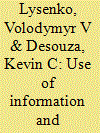

|
|
|
|
|
| Summary/Abstract |
Information and communication technology have played an important role in the tactics of uprisings against non-democratic regimes worldwide. However, there has been little attention paid in studies so far of how authorities in those countries employ such information and communication technology. In this article we examine the evolution of such tactics as employed by one of the most ingrained authoritarian regimes—that of Belarus—during the decade 2001 to 2010. The political opposition's responses to the authorities' countermeasures are also investigated, followed by an analysis of the co-evolution of these opponents' tactics.
|
|
|
|
|
|
|
|
|
|
|
|
|
|
|
|
| 11 |
ID:
107863
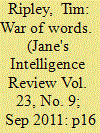

|
|
|
|
|
|
|
|